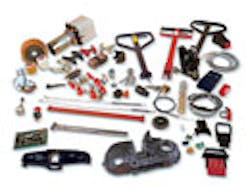As fuel prices and commodities prices have gone through the roof in the past year, fleets are looking to cut costs in any way possible. Knowing that, counterfeiters have stepped up efforts to get potentially unsafe materials into the marketplace, as customers often can’t tell the difference.
“Things are getting worse in the counterfeiting realm,” Andy Cifranic, brand manager for Bendix Commercial Vehicle Systems, told FleetOwner. “It’s still a relatively new phenomenon, really only becoming a problem in the last half a dozen years or so. I would speculate it is because of globalization and the spread of information, as well as the higher cost of doing business nowadays.”
According to Cifranic, most counterfeit goods are coming from outside the U.S., primarily Southeast Asia. Counterfeiters attempt to replicate goods already on the market, which are then shipped into North America and placed on the shelves next to legitimate products.
“Businesses find an opportunity to buy something that looks like what they are already buying at lower prices,” Cifranic said. “There is a big safety risk, especially since these are safety-related products.”
“Market pressures are always making the market place more competitive, with both legitimate competition and the counterfeit competition,” Carl Mesker,
director of Aftermarket Product Planning and Market Development for SAF-Holland, told FleetOwner. “There is not a doubt in my mind that the worsening business conditions have created more opportunity for counterfeit parts to enter the market. Dealing with counterfeit parts has led to additional responsibilities for legal and marketing departments today.
“I don’t think there is a single source of how counterfeit parts get into the market,” Mesker added. “If there were it would be a simple problem to solve. It can come from any level of distribution and from anyone within that distribution chain who can benefit by peddling a counterfeit.”
Last month, representatives of the Motor & Equipment Manufacturers Assn. (MEMA) and its Brand Protection Council (BPC) testified before the Senate Judiciary Committee that enforcement efforts for protection of trademarks, trade dress, patents and copyrights should be increased.
The Brand Protection Council sets MEMA’s priorities in the counterfeiting, diversion, non-compliant products and intellectual property rights realms. It meets four times each year and is open to any member of the Automotive Aftermarket Suppliers Assn. (AASA), Heavy Duty Manufacturers Assn. (HDMA) or the Original Equipment Suppliers Assn. (OESA).
Jeff Thurnau, patent counsel for Gates Corp. and a member of BPC, testified before the Senate Committee and urged the passage of legislation to strengthen motor vehicle suppliers’ ability to address their protections for trademarks, trade dress, patents and copyrights.
“For example, at Gates, we are developing a range of energy-efficiency solutions that reduce the cost of operating motor vehicles that enhance our environment, and reduce dependency on foreign oil,” Thurnau said. “However, every time the integrity of our brand and technology is violated by intellectual property pirates our business model and technological leadership is under assault. Clearly, strong intellectual property protection benefits the Gates Corp., our communities, our customers, and ultimately the American people.”
“Every year, counterfeiters steal companies’ good names and brand reputation – and put consumers at serious risk with unsafe, fake parts,” said Bob McKenna, president & CEO of MEMA. “The crime takes a huge toll on the motor vehicle parts industry, costing the global industry $12 billion in lost sales and U.S. parts makers $3 billion annually. Sales lost to counterfeiters also cost U.S. manufacturing jobs – an estimated 200,000 to 250,000 American jobs. We urge the Senate to move forward with this legislation to protect consumers and American jobs.”
"This is not an individual company problem, it is an industry problem," said Steve Handschuh, executive director of AASA and vp of MEMA. "Because we're all in this together, we can collectively learn from each other and decide the best actions to take to combat counterfeiting and protect intellectual property."
“The counterfeiter’s main objective is to deceive,” SAF-Holland’s Mesker said. “They sometimes will do this by using similar part and model numbers, and even logos. Although logos, fonts and style will be similar, they will not match exactly. As the old adage goes, ‘If you familiarize yourself with the authentic it will be easy to detect the counterfeit.’
According to Bendix’s Cifranic, the company uses a three-pronged attack against counterfeiters—protecting legal rights through trademarks and patents, enforcing these rights in the marketplace through tips from customers and the company’s sales force, and providing education and awareness to customers and salesmen.
Cifranic added that there are three ways to protect against buying counterfeit parts—buy from a trusted source, look for genuine marks on the product and the box, and that another old adage is true: “If the price seems to be too good to be true, it probably is,” he said.
View more Fleet Owner news relating to trucking safety, trucking regulations and driver awareness.
